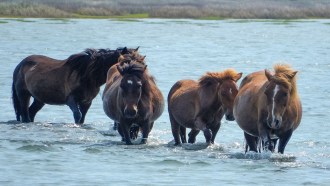
Jonathan Lambert
Staff Writer, Biological Sciences, 2019-2021
Jonathan Lambert was a staff writer covering biological sciences at Science News from 2019 to 2021. He earned a master’s degree from Cornell University studying how a bizarre day-long mating ritual helped accelerate speciation in a group of Hawaiian crickets. A summer at the Dallas Morning News as a AAAS Mass Media fellow sparked a pivot from biologist to science journalist. He previously wrote for Quanta Magazine, NPR, and Nature News.

Trustworthy journalism comes at a price.
Scientists and journalists share a core belief in questioning, observing and verifying to reach the truth. Science News reports on crucial research and discovery across science disciplines. We need your financial support to make it happen – every contribution makes a difference.
All Stories by Jonathan Lambert
-
 Animals
AnimalsMale mammals aren’t always bigger than females
In a study of over 400 mammal species, less than half have males that are, on average, heavier than females, undermining a long-standing assumption.
-
 Animals
AnimalsA 1,306-legged millipede is the first to live up to its name
Scientists have discovered the first true millipede, an elongated, threadlike creature with a whopping 1,306 legs.
-
 Life
LifeA terrifying robot can thwart invasive mosquito fish
A robot designed to mimic a natural predator of mosquito fish can impair the survival and reproduction of this costly invasive species.
-
 Life
LifeCleared tropical forests can regain ground surprisingly fast
Tropical forests can re-establish themselves on abandoned agricultural lands faster than expected, scientists say.
-
 Life
LifeLight-colored feathers may help migrating birds stay cool on long flights
Analysis of over 20,000 illustrations of birds reveals that migrating birds generally tend to have lighter-colored feathers than birds that stay put.
-
 Climate
ClimateA new map shows where carbon needs to stay in nature to avoid climate disaster
Scientists have mapped the location of key natural carbon stores. Keeping these areas intact is crucial to fighting climate change.
-
 Animals
AnimalsClimate change may be shrinking tropical birds
Scientists had previously found that migratory birds are getting smaller as temperatures rise. Dozens of tropical, nonmigratory species are too.
-
 Animals
AnimalsBaleen whales eat (and poop) a lot more than we realized
The sheer volume of food that some whales eat and then excrete suggests the animals shape ecosystems to a much larger degree than previously thought.
-
 Health & Medicine
Health & MedicineWhat does the first successful test of a pig-to-human kidney transplant mean?
For the first time, a pig organ was successfully attached to a human patient. It’s a step toward vastly increasing the supply of organs.
-
 Animals
AnimalsScientists found modern domestic horses’ homeland in southwestern Russia
Two genes tied to endurance and docility may help explain the horses’ success in spreading across Eurasia.
-
 Chemistry
ChemistryAn easier, greener way to build molecules wins the chemistry Nobel Prize
Chemists Benjamin List and David MacMillan have sparked a whole new field that’s aided drug discovery and made chemistry more environmentally friendly.
-
 Genetics
GeneticsAll identical twins may share a common set of chemical markers on their DNA
Identical twins may share a set of unique chemical tags on their DNA that could be used to identify individuals who were conceived as identical twins.